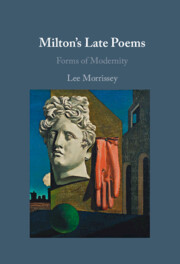Chapter 2 - The Reformation of Paradise Lost
Moderating Modernity with Measurement
Published online by Cambridge University Press: 18 August 2022
Summary
This chapter explores structural differences between the 1667 ten-book edition and the revised twelve-book version of 1674, not only to continue a reconsideration of Eve, but to revive attention to the implications of the formal properties of the revision, and to argue that this reformation formally embodies the narrative’s claims about how to adjust to modernity. The drama created by the final, reconfigured two books highlights how Adam and Eve and their relationship change and grow during the poem. At the end, the poem’s profound linguistic tensions are instantiated by Eve, while Adam’s reaction and the narrator’s description emphasize the pleasures of pluralistic readings. In short, the reformation of Paradise Lost rebalances the poem, by countering the scale of the consequences from the War in Heaven with a proportional rearrangement of the invocations. Its twelve-book shape mitigates against loss and creates a space to emphasize the continued growth of the two human characters, particularly Adam. Perhaps most importantly, the new, concluding pair of books provide a space of non-domination in which Eve can emerge and be recognized as the poet she is.
Keywords
- Type
- Chapter
- Information
- Milton's Late PoemsForms of Modernity, pp. 62 - 84Publisher: Cambridge University PressPrint publication year: 2022

